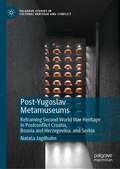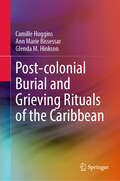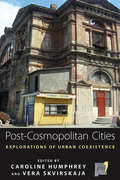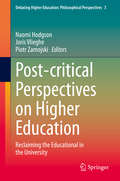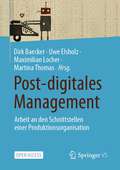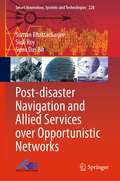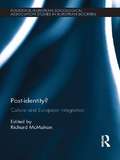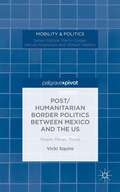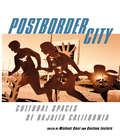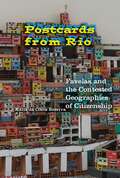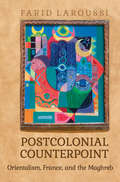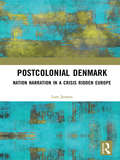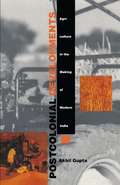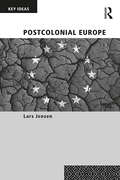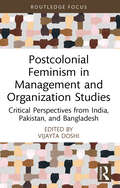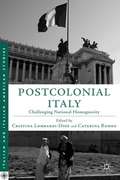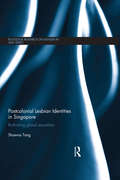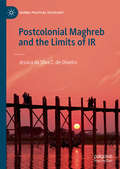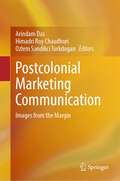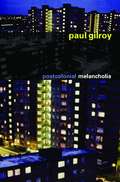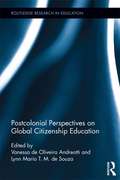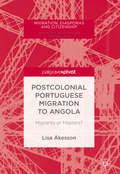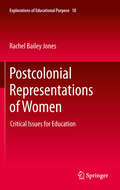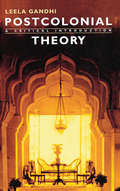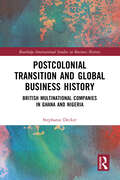- Table View
- List View
Post-Yugoslav Metamuseums: Reframing Second World War Heritage in Postconflict Croatia, Bosnia and Herzegovina, and Serbia (Palgrave Studies in Cultural Heritage and Conflict)
by Nataša JagdhuhnThis book analyzes how Second World War heritage is being reframed in the memorial museums of the post-socialist, post-conflict states of Croatia, Bosnia and Herzegovina, and Serbia. It argues that in all three countries, a reluctance to confront undesirable parts of their national histories is the root cause explaining why the state-funded Second World War memorial museums remain stuck in the postsocialist transition. In most cases, Second World War museums, exhibitions, and displays conceived in the Yugoslav period have been left unchanged. However, there are also examples where new sections were added to the old ones and there are a small number of completely reconceptualized permanent exhibitions. The transitional position of the Second World War museums has made it possible to view these institutions as historical formations in their own right. The book will appeal to students and academics working in the fields of heritage and museums studies, memory studies, and cultural history of Southeast-Europe.
Post-colonial Burial and Grieving Rituals of the Caribbean
by Ann Marie Bissessar Camille Huggins Glenda M. HinksonThis book brings together anthropological and historical studies that analyze burial rituals within the Caribbean through the theoretical lens of syncretism and the hybridization of post-colonial and contemporary time periods. Based on oral historiography, historical document analysis and ethnographic interviews, the chapters in this volume outlay the creolization of ancestral burial rituals in the wider Caribbean and present case studies of eight Caribbean countries: Barbados, Haiti, Grenada, Guyana, Suriname, St. Lucia, St. Vincent and Trinidad and Tobago. This contributed volume is edited by scholars from different disciplines such as social work, psychology, and political science, providing an interwoven lens of individual human, political and environmental contexts. Contributing authors are from diverse disciplines such as anthropology, communications, sociology, political science, social work, and psychology and each discipline approaches the subject matter through their perspective lenses. Each chapter analyzes the hybridity of the burial rituals in the construction of culture and identity within conditions of colonial antagonism and inequity and is rich with oral histories from lay community historians, firsthand accounts, and historical texts. Post-colonial Burial and Grieving Rituals of the Caribbean will be of interest to scholars of cultural and religious anthropology, history and sociology, as it highlights the importance of grief and shows how it is encapsulated into burial traditions that are transmitted intergenerationally and express important aspects of Caribbean cultures.
Post-cosmopolitan Cities
by Caroline Humphrey Vera SkvirskajaExamining the way people imagine and interact in their cities, this book explores the post-cosmopolitan city. The contributors consider the effects of migration, national, and religious revivals (with their new aesthetic sensibilities), the dispositions of marginalized economic actors, and globalized tourism on urban sociality. The case studies here share the situation of having been incorporated in previous political regimes (imperial, colonial, socialist) that one way or another created their own kind of cosmopolitanism, and now these cities are experiencing the aftermath of these regimes while being exposed to new national politics and migratory flows of people.
Post-critical Perspectives on Higher Education: Reclaiming the Educational in the University (Debating Higher Education: Philosophical Perspectives #3)
by Naomi Hodgson Joris Vlieghe Piotr ZamojskiThis book addresses essential educational dimensions of the university that are often overlooked, not only by prevailing discourses and practices but also by standard critical approaches to higher education. Each chapter takes a different approach to the articulation of a ‘post-critical’ view of the university, and focuses on a specific dimension, including lectures, academic freedom, and the student experience. The ‘post-critical’ attitude offers an affirmative approach to the constitutive educational practices of the university. It is ‘post-’ because it is a movement in thought that comes after the critical, which, in its modern and postmodern forms is considered, in Latour’s terms, to have ‘run out of steam’. It is an attempt to articulate new conceptual and methodological tools that help us grasp our current conditions. It is not anti-critique; but rather than seeking to debunk current practices, this affirmative approach offers perspectives that shed new light on what we do as educators, on the essence of our educational practices, and on their immanent value. The focus on the educational, then, applies not only to practices that happen to take place in the educational space of the university, but also to those practices whose value we can understand in educational terms.
Post-digitales Management: Arbeit an den Schnittstellen einer Produktionsorganisation
by Dirk Baecker Uwe Elsholz Maximilian Locher Martina ThomasDiese Open-Access-Publikation handelt von Digitalisierungsprojekten in kleinen und mittleren Unternehmen. Es werden Forschungsergebnisse und Praxisbeobachtungen in Beiträgen, Interviews und Handouts von Wissenschaftlern und Praktikern präsentiert.
Post-disaster Navigation and Allied Services over Opportunistic Networks (Smart Innovation, Systems and Technologies #228)
by Siuli Roy Sipra Das Bit Suman BhattacharjeeThis book provides the details of developing a digital pedestrian map construction system over the intermittently connected mobile network. Over the past couple of decades, countries across the world, both developing and developed, have witnessed a significant number of disasters. Thus, it has become mandatory for each of the disaster-prone countries to equip themselves with appropriate measures to cope with the challenges of providing post-disaster services. Some of the serious challenges are incapacitated communication infrastructure, unstable power supply and inaccessible road networks. Out of these challenges, the destruction of road networks, especially in developing countries, acts as a major hindrance to effective disaster management. To be more specific, the success of a disaster response operation generally depends on the speed of evacuation and transportation of adequate amount of relief materials at the right time to the disaster-affected areas. Hence, map-based navigation support is a primary requirement for post-disaster relief operations. This book also provides the solution of the two other important post-disaster management services such as situational awareness and resource allocation. Both of these services are invariably dependent on the existence of navigation support. Finally, in order to offer such services, the other challenge is to address the problem of incapacitated communication infrastructure. This book also deals with such challenges in post-disaster scenarios and develops automated post-disaster management services.
Post-identity?: Culture and European Integration (Studies in European Sociology)
by Richard McMahonCollective identity, the emotionally powerful sense of belonging to a group, is a crucial source of popular legitimacy for nations. However efforts since the 1990s to politically support European integration by using identity mechanisms borrowed from nationalism have had very limited success. European integration may require new, post-national approaches to the relationship between culture and politics. This controversial and timely volume poses the logical question: if identity doesn't effectively connect culture with European integration politics, what does? The book brings together leading scholars from several of the disciplines that have developed concepts of culture and methods of cultural research. These expert interdisciplinary contributors apply a startling diversity of approaches to culture, linking it to facets of integration as varied as external policy, the democratic deficit, economic dynamism and the geography of integration. This book examines commonalities and connections within the European space, as well as representations of these in identity discourses. It will be useful for students and scholars of sociology, geography, anthropology, social psychology, political science and the history of European integration.
Post/Humanitarian Border Politics between Mexico and the US: People, Places, Things
by Vicki SquireWhat is the significance of the things that migrants leave behind in contemporary border struggles? In what ways do places like the desert play a role in such struggles? And what is the status of people in this context? The author addresses these questions by assessing the politics of different humanitarian interventions in the Mexico-US border region. Examining various artistic and academic engagements of things left behind, as well as legal struggles over the distribution of water bottles and practices of recycling of discarded belongings, this book develops a unique 'more-than-human' perspective on the significance of people, places and things to humanitarian border struggles. While drawing attention to the ambiguities of humanitarian interventions, Squire also focuses on the critical potential of a post/humanitarian border politics that transforms place by fighting for people, through things.
Postborder City: Cultural Spaces of Bajalta California
by David Palumbo-Liu Lawrence A. Herzog N Michael Dear H Gustavo Leclerc Jo-Anne Berelowitz Selma Holo Norma Iglesias Phoebe S. Kropp Carlos Monsiv Richard CThe postborder metropolis of Bajalta California stretches from Los Angeles in the north to Tijuana and Mexicali in the south. Immigrants from all over the globe flock to Southern California, while corporations are drawn to the low wage industry of the Mexican border towns, echoing developments in other rapid growth areas such as Phoenix, El Paso, and San Antonio. This incredibly diverse, transnational megacity is giving birth to new cultural and artistic forms as it rapidly evolves into something unique in the world. Postborder City is a genuinely interdisciplinary investigation of the hybrid culture on both sides of the increasingly fluid U. S.-Mexico border, spanning the disciplines of art and art history, urban planning, geography, Latina/o studies, and American studies.
Postcards from Rio: Favelas and the Contested Geographies of Citizenship
by Kátia da BezerraThrough the analysis of a variety of favela-based visual cultural productions by young people and contemporary theorists, Postcards from Rio examines the complex relationship between citizenship and urban space in contemporary Rio de Janeiro.By analyzing videos and photographs, Kátia da Costa Bezerra illustrates how citizens of favelas are reshaping their sense of belonging as subjects and as a legitimate part of the city. A groundbreaking study that examines more deeply the relationship between urban space, citizenship, and imagery originating in the favelas, Postcards from Rio sheds crucial light on how contemporary lenses are defining and mediating the meanings of space and citizenship as strategies of empowerment. The city emerges as a political space where multiplicities of perspectives are intertwined with demands for more inclusive forms of governance.
Postcolonial Counterpoint: Orientalism, France, and the Maghreb (University of Toronto Romance Series)
by Farid LaroussiPostcolonial Counterpoint is a critical study of Orientalism and the state of Francophone and postcolonial studies, examined through the lens of the historical and cross-cultural relations between France and North Africa. Thoroughly questioning the inability of Western academia to shake free of universalism and essentialism and come to grips with the Orientalism within postcolonial discourse, Farid Laroussi offers a cultural tour d'horizon which considers André Gide's writing on Algeria, literature by French authors of Maghrebi descent, and the conversation surrounding secularism and the headscarf in France. A provocative investigation of the place of Muslims and Islam in Francophone culture, Postcolonial Counterpoint asks how we must proceed if postcolonial studies is to make a difference in reconciling history, identity, citizenship, and Islam in the West.
Postcolonial Denmark: Nation Narration in a Crisis Ridden Europe
by Lars JensenThis book adopts a global approach to analysing Danish nationhood in the current context of a Europe paralysed by crises. Focusing on the global strands which have produced understandings of national selfhood as a consequence of a series of historical and contemporary global encounters, it calls for the production of narratives which better capture how European nations, including Denmark, are shaped by narratives that cannot be understood in (national) isolation, but are contingent on ideas about the nation’s globality. In historical terms, this entails examining how colonialism shaped national self-perceptions; in a contemporary context, it requires looking at colonialism’s unfinished business. The first chapters revisits colonialism throughout the Danish empire. In the second section, the book revisits Danish (post-1945) attempts to restage global interventions and military intervention since 2000, and considers how migration since 1965 has led to a profound questioning of relationships with the non-European world – and increasingly with Europe itself. Postcolonial Denmark situates Denmark at the centre of a number of current and ever more urgent challenges facing Europe. As such, it will appeal to scholars of sociology, political science and cultural studies with interests in Europe, the Nordic region through a postcolonial, a whiteness and a decolonial inspired approach.
Postcolonial Developments: Agriculture in the Making of Modern India
by Akhil GuptaThis definitive study brings together recent critiques of development and work in postcolonial studies to explore what the postcolonial condition has meant to rural people in the Third World. Focusing on local-level agricultural practices in India since the "green revolution" of the 1960s, Akhil Gupta challenges the dichotomy of "developed" and "underdeveloped," as well as the notion of a monolithic postcolonial condition. In so doing, he advances discussions of modernity in the Third World and offers a new model for future ethnographic scholarship. Based on fieldwork done in the village of Alipur in rural north India from the early 1980s through the 1990s, Postcolonial Developments examines development itself as a post-World War II sociopolitical ideological formation, critiques related policies, and explores the various uses of the concept of the "indigenous" in several discursive contexts. Gupta begins with an analysis of the connections and conflicts between the world food economy, transnational capital, and technological innovations in wheat production. He then examines narratives of village politics in Alipur to show how certain discourses influenced governmental policies on the green revolution. Drawing links between village life, national trends, and global forces, Gupta concludes with a discussion of the implications of environmentalism as exemplified by the Rio Earth Summit and an examination of how global environmental treaties may detrimentally affect the lives of subaltern peoples. With a series of subtle observations on rural politics, nationalism, gender, modernization, and difference, this innovative study capitalizes on many different disciplines: anthropology, sociology, comparative politics, cultural geography, ecology, political science, agricultural economics, and history.
Postcolonial Europe (Key Ideas)
by Lars JensenThis book presents an overview of the direct and indirect ways in which Europe continues to be influenced by its entrenched postcolonial condition. Exploring the notion of postcolonial Europe as it characterises a Europe caught at a number of crossroads, it considers the distinctly European features of a range of global crises by which Europe is beset, relating to migration, nationalism, internationalism, climate change and inequality. Linking these to the legacy of European hegemony during the era of high imperialism and the inability to come to terms with the region’s increasingly provincialised status, the reversal of migrant flows following the implosion of European empires, and the dismantling of welfare societies initially made possible by the accumulation of wealth during colonialism, the author examines the gradual disintegration of the idea of the European collectivity and the erosion of the idea that Europe is a dispenser of privileged status. A wide-ranging study of Europe’s crisis in its postcolonial era, this volume will appeal to scholars of critical sociology, political geography, cultural studies, anthropology, political science and history with interests in colonialism and postcolonialism.
Postcolonial Feminism in Management and Organization Studies: Critical Perspectives from India, Pakistan, and Bangladesh (Routledge Focus on Women Writers in Management and Organization Studies)
by Vijayta DoshiThe term feminism is often treated as a stable and universalizing politics and practice. For postcolonial feminism, the issues of interest are not only social and cultural inequalities in terms of caste, class, color, ethnicity, gender, and religion, but also historical, political, and geographical inequalities in terms of “Third World”, “Global South” and “remnants of the colonial past”. Postcolonial feminism pays nuanced attention to historical diversity and local specificity of feminist issues. This book draws upon the work grounded specifically in the context of India, Pakistan, and Bangladesh to demonstrate the plurality of thinking. In mainstream management and organization studies, context is often understood as a present, static field. This book discusses how context is an important consideration for any management and organization study and for feminist studies in management and organization studies. It informs the way we need to understand context not just as “present” but also as “past”. Postcolonial feminism highlights the historical roots and past privileges of a context that often gets overlooked in management and organization studies, where context is mostly understood in the present.This book highlights the contributions of women writers, poets, and activists such as Christina Stringer, Elena Samonova, Gayatri Spivak, Mary Douglas, Naila Kabeer, and Uzma Falak to postcolonial feminism in management and organization studies. Each of these women has engaged with writing that has the potential to enrich and transform understanding of postcolonial feminism in management and organization studies, making this book a valuable resource for researchers, academics, and advanced students.
Postcolonial Italy: Challenging National Homogeneity (Italian and Italian American Studies)
by Cristina Lombardi-Diop Caterina RomeoThis volume constitutes a multidisciplinary intervention into the emerging field of postcolonial studies in Italy, bringing together cultural and social history, critical and political theory, literary and cinematic analyses, ethnomusicology and cultural studies, anthropological fieldwork, and race, gender, diaspora, and urban studies.
Postcolonial Lesbian Identities in Singapore: Re-thinking global sexualities (Routledge Research on Gender in Asia Series)
by Shawna TangTaking lesbians in Singapore as a case study, this book explores the possibility of a modern gay identity in a postcolonial society, that is not dependent on Western queer norms. It looks at the core question of how this identity can be reconciled with local culture and how it relates to global modernities and dominant understandings of what it means to be queer. It engages with debates about globalization, post-colonialism and sexuality, while emphasising the specificity, diversity and interconnectedness of local lesbian sexualities.
Postcolonial Maghreb and the Limits of IR (Global Political Sociology)
by Jessica da OliveiraThis book explores narratives produced in the Maghreb in order to illustrate shortcomings of imagination in the discipline of international relations (IR). It focuses on the politics of narrating postcolonial Maghreb through a number of writers, including Abdelkebir Khatibi, Fatema Mernissi, Kateb Yacine and Jacques Derrida, who explicitly embraced the task of (re)imagining their respective societies after colonial independence and subsequent nation-building processes. Narratives are thus considered political acts speaking to the turbulent context in which postcolonial Maghrebian Francophone literature emerges as sites of resistance and contestation. Throughout the chapters, the author promotes an encounter between narratives from the Maghreb and IR and makes a case for the kinds of thinking and writing strategies that could be used to better approach international and global studies.
Postcolonial Marketing Communication: Images from the Margin
by Arindam Das Himadri Roy Chaudhuri Ozlem Sandikci TurkdoganThis volume approaches marcomm (marketing communication) from the phenomenology of markets in the context of the Global South and its postcolonial experiences. It provides a fresh perspective to the current paradigm and offers a fresh discourse on the current theories of marketing communication. The book demonstrates how marketing communication, an essentially Global North discourse reinforcing hegemony, can be critiqued and deconstructed when subjected to postcolonial critical analysis. Recognizing as commonplace, the Global South has either willingly embraced or been ideologically coerced into adopting a Western marketing communication system. This system is evident in its theories and practices, mirroring Western themes, symbols, stories, and knowledge frameworks, consequently fostering subjectivities that lack critical self-reflection and are dependent on Western influences. But what remains more interesting is how such an ideological system, mediated through a quintessential Global South modernity, generates a new habitation of modernity at the margin. Essentially a reaction from the Global South perspective, the book thoroughly examines the realities around marketing communication discourses. The book even engenders alternatives to hegemonic marketing communication discourses and a set of “other” epistemologies of alternate modernities of equity and justice. From African to Turkish, from Indian to Canadian first nations, Australian Aborigines to Polynesian-American, postcolonial subjectivities through marcomm across the globe get a voice in the volume. The collection in this volume is a decolonizing attempt that thwarts cultural globalization, examines colonial discourses, cuts across essentialized identities, mobilizes resistance, interrogates power structures and mechanisms of knowledge production, dissemination, and legitimization, and celebrates the new-formed cultural identity of the Third/Fourth World. The book is essential read for researchers, students and practitioners of Marketing who wish to gain a deeper understanding of an oft ignored aspect of marcomm.
Postcolonial Melancholia (The Wellek Library Lectures)
by Paul GilroyIn an effort to deny the ongoing effect of colonialism and imperialism on contemporary political life, the death knell for a multicultural society has been sounded from all sides. That's the provocative argument Paul Gilroy makes in this unorthodox defense of the multiculture. Gilroy's searing analyses of race, politics, and culture have always remained attentive to the material conditions of black people and the ways in which blacks have defaced the "clean edifice of white supremacy." In Postcolonial Melancholia, he continues the conversation he began in the landmark study of race and nation 'There Ain't No Black in the Union Jack' by once again departing from conventional wisdom to examine—and defend—multiculturalism within the context of the post-9/11 "politics of security."This book adapts the concept of melancholia from its Freudian origins and applies it not to individual grief but to the social pathology of neoimperialist politics. The melancholic reactions that have obstructed the process of working through the legacy of colonialism are implicated not only in hostility and violence directed at blacks, immigrants, and aliens but in an inability to value the ordinary, unruly multiculture that has evolved organically and unnoticed in urban centers. Drawing on the seminal discussions of race begun by Frantz Fanon, W. E. B. DuBois, and George Orwell, Gilroy crafts a nuanced argument with far-reaching implications. Ultimately, Postcolonial Melancholia goes beyond the idea of mere tolerance to propose that it is possible to celebrate the multiculture and live with otherness without becoming anxious, fearful, or violent.
Postcolonial Perspectives on Global Citizenship Education (Routledge Research in Education)
by Vanessa de Oliveira Andreotti Lynn Mario T. M. de SouzaThis volume bridges the gap between contemporary theoretical debates and educational policies and practices. It applies postcolonial theory as a framework of analysis that attempts to engage with and go beyond essentialism, ethno- and euro-centrisms through a critical examination of contemporary case studies and conceptual issues. From a transdisciplinary and post-colonial perspective, this book offers critiques of notions of development, progress, humanism, culture, representation, identity, and education. It also examines the implications of these critiques in terms of pedagogical approaches, social relations and possible future interventions.
Postcolonial Portuguese Migration to Angola: Migrants or Masters? (Migration, Diasporas and Citizenship)
by Lisa ÅkessonGrounded in extensive and original ethnographic fieldwork, this book makes a novel contribution to migration studies by examining a European labour migration to the Global South, namely contemporary Portuguese migration to Angola in a postcolonial context. In doing so, it explores everyday encounters at work between the Portuguese migrants and their Angolan “hosts”, and it analyses how the Luso-African postcolonial heritage interplays with the recent Portuguese-Angolan migration in the (re-)construction of power relations and identities. Based on ethnographic interviews, the book describes the Angolan-Portuguese relationship as characterized not only by hierarchies of power, but also by ambivalence and hybridity. This research demonstrates that the identities of the ex-colonized Angolan and the Portuguese ex-colonizer are shaped by a history of unequal and violent power relations. Further, it reveals how this history has produced a sense of intimacy between the two, and the often fraught nature of this relationship. Combining a strong connection to the field of migration studies with a postcolonial perspective, this original work will appeal to students and scholars of migration, postcolonial studies, the sociology of work and African Studies.
Postcolonial Representations of Women: Critical Issues for Education
by Rachel Bailey JonesIn this accessible combination of post-colonial theory, feminism and pedagogy, the author advocates using subversive and contemporary artistic representations of women to remodel traditional stereotypes in education. It is in this key sector that values and norms are molded and prejudice kept at bay, yet the legacy of colonialism continues to pervade official education received in classrooms as well as 'unofficial' education ingested via popular culture and the media. The result is a variety of distorted images of women and gender in which women appear as two-dimensional stereotypes. The text analyzes both current and historical colonial representations of women in a pedagogical context. In doing so, it seeks to recast our conception of what 'difference' is, challenging historical, patriarchal gender relations with their stereotypical representations that continue to marginalize minority populations in the first world and billions of women elsewhere. These distorted images, the book argues, can be subverted using the semiology provided by postcolonialism and transnational feminism and the work of contemporary artists who rethink and recontextualize the visual codes of colonialism. These resistive images, created by women who challenge and subvert patriarchal modes of representation, can be used to create educational environments that provide an alternative view of women of non-western origin.
Postcolonial Theory: A critical introduction
by Leela GandhiPostcolonial Theory is a ground-breaking critical introduction to the burgeoning field of postcolonial studies.Leela Gandhi is the first to clearly map out this field in terms of its wider philosophical and intellectual context, drawing important connections between postcolonial theory and poststructuralism, postmodernism, marxism and feminism. She assesses the contribution of major theorists such as Edward Said, Gayatri Spivak and Homi Bhabha, and also points to postcolonialism's relationship to earlier thinkers such as Frantz Fanon and Mahatma Gandhi.The book is distinctive in its concern for the specific historical, material and cultural contexts for postcolonial theory, and in its attempt to sketch out the ethical possibilities for postcolonial theory as a model for living with and 'knowing' cultural differences non-violently.Postcolonial Theory is a useful starting point for readers new to the field and a provocative account which opens possibilities for debate.
Postcolonial Transition and Global Business History: British Multinational Companies in Ghana and Nigeria (Routledge International Studies in Business History)
by Stephanie DeckerBritish multinationals faced unprecedented challenges to their organizational legitimacy in the middle of the twentieth century as the European colonial empires were dismantled and institutional transformations changed colonial relationships in Africa and other parts of the world. This book investigates the political networking and internal organizational changes in five British multinationals (United Africa Company, John Holt & Co., Ashanti Goldfields Corporation, Bank of West Africa and Barclays Bank DCO). These firms were forced to adapt their strategies and operations to changing institutional environments in two English-speaking West African countries, Ghana (formerly the Gold Coast) and Nigeria, from the late 1940s to the late 1970s. Decolonization meant that formerly imperial businesses needed to develop new political networks and change their internal organization and staffing to promote more Africans to managerial roles. This postcolonial transition culminated in indigenization programmes (and targeted nationalizations) which forced foreign companies to sell equity and assets to domestic investors in the 1970s. Postcolonial Transition and Global Business History is the first in-depth historical study on how British firms sought to adapt over several decades to rapid political and economic transformation in West Africa. Exploring both postcolonial transitions and development discourse, this book addresses the topics with regard to business and economic history and will be of interest to researchers, academics, and students in the fields of organizational change, political economy, African studies and globalization.
